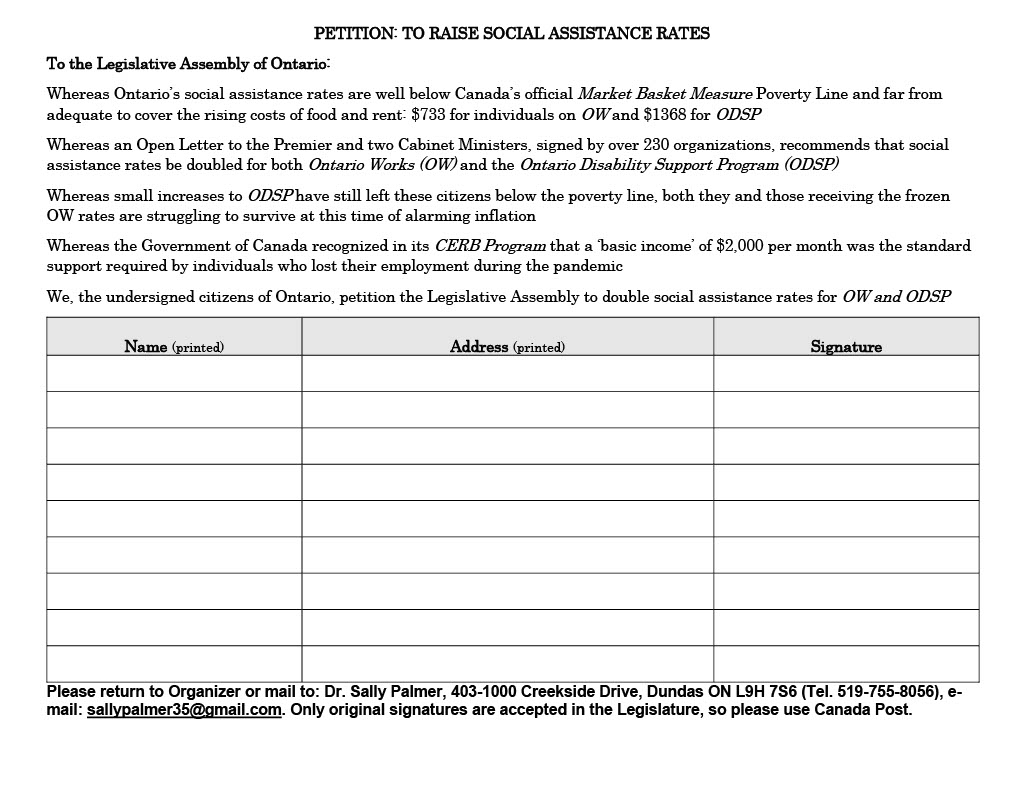Take action to solve food insecurity!
Mike Schreiner Reads our Petitions into the Legislative Assembly
On October 28th, 2024 Guelph MPP Mike Schreiner read the petition to the government of Ontario to double the rate of assistance provided to people using OSDP and OW. We believe that doubling social assistance rates will help to lift Ontarians who rely on the supports out of poverty.
We want to thank MPP Mike Schreiner for amplifying our community voices and pushing for root cause solutions to poverty. We are deeply grateful to MPP Mike Schreiner for his ongoing support in advocating for policies that reflect the values and needs of the Guelph and Wellington community.
Join us in tackling poverty by supporting the petitions with signature pages below!
Sign the Petition to the Government of Ontario to double social assistance rates
This is a Legislative Assembly of Ontario petition, which means all signatures must be written on a hard copy. Unfortunately, this type of petition cannot be virtual. The Poverty Elimination Collaborative is local organizer for the petition which is part of a broader campaign led by Dr. Sally Palmer.
How to sign the petition:
1. Download, print and sign the petition. If you can, try to fill the page by asking friends, family and others to sign as well!
2. Mail or drop the petition off to us at our office (open Tuesday-Thursday):
Guelph & Wellington Elimination Collaborative
c/o United Way Guelph Wellington Dufferin
85 Westmount Road
Guelph, ON,
N1H 5J2
Click the petition to read and download it.
Please do not send the petition to Dr. Sally Palmer as noted on the petition. The Poverty Elimination Collaborative is acting as the organizer in Guelph and Wellington County.
Are you interested in volunteering for the campaign? Please contact Chelsey Edwards at [email protected] for more information!
See more information and frequently asked questions below.
Want to take action in a different way? It’ll only take 2 mins!
More Information & Frequently asked questions
Why are we using a printed petition instead of a virtual petition?
The petition we are using is a Legislative Assembly of Ontario petition, which means all signatures must be written and submitted on a hard copy. Unfortunately, this type of petition cannot be virtual. The benefit of this type of petition is…with an MPP’s support, it can presented to the Legislative Assembly and the Government of Ontario must respond within 24 days.
From consulting key players engaged in provincial advocacy, we feel this will be more effective than a virtual petition at this time. This petition also has some great momentum behind it due to it being part of a broader campaign by Dr. Sally Palmer.
Learn more about Legislative Assembly of Ontario petitions on the petition webpage.
Can I sign the petition in a different way than listed above?
Yes, we will have the petition with us at events and at locations across Guelph and Wellington County on an ongoing basis. We will list these locations and other locations to drop off petitions below as they are available.
If you need support with the petition, please contact Chelsey Edwards at: [email protected]
Why does the petition focus on social assistance rates?
Social assistance rates are keeping people in poverty. Households that are most likely to experience food insecurity have social assistance as their main source of income, which points to how inadequate these programs are at supporting people to meet their basic needs.
In Ontario, social assistance includes two programs: Ontario Works (OW) and the Ontario Disability Support Program (ODSP). Currently, a single person on OW receives a maximum of $733 per month, while a single person on ODSP is $1,308 a month. Though very small increases have been made to ODSP, OW rates have been frozen since 2018. This must change.
Why does the campaign’s advocacy focus on the provincial government?
The Income Security for Food Security campaign is focusing on the provincial government because they are responsible for key areas of policy that can have a significant impact on solving food insecurity. These include:
- Overseeing social assistance rates and how OW and ODSP are administered
- Setting provincial minimum wages and working conditions through the Employment Standards Act
- Having a role in housing policy and funding decisions that can support affordable housing
Learn more on the Income Security for Food Security campaign landing page.


